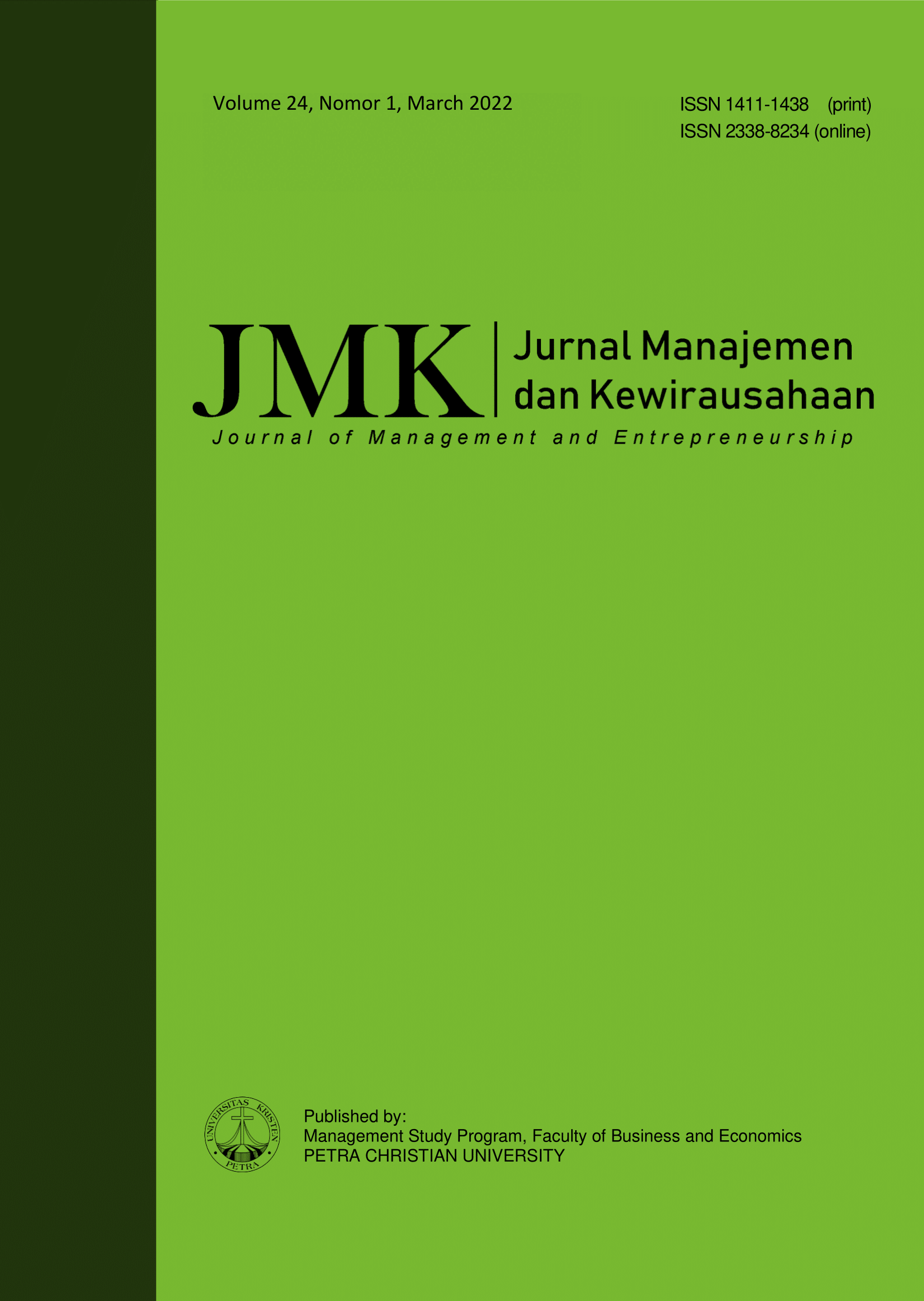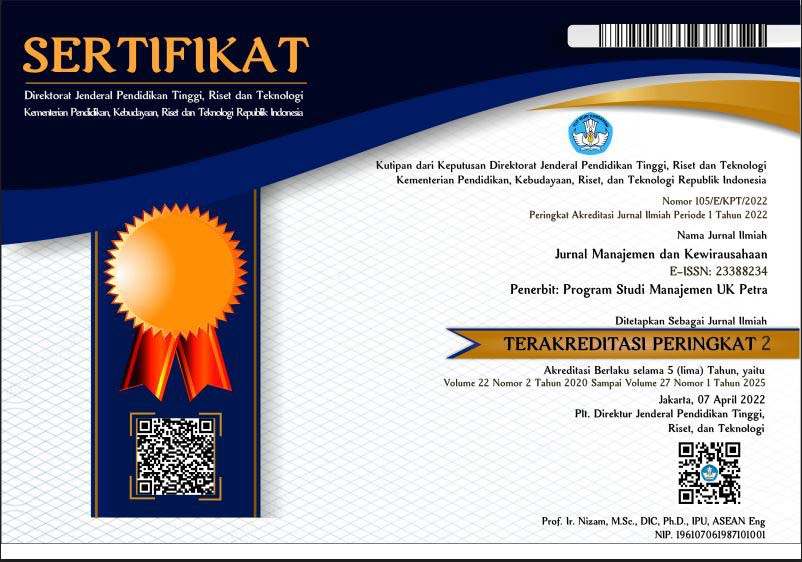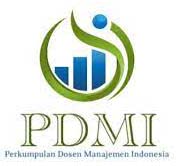ENTREPRENEURIAL FAILURE AND RESILIENCE: A CONTINUOUS INTERPLAY BETWEEN RIGIDITY AND FLEXIBILITY
DOI:
https://doi.org/10.9744/jmk.24.1.1-14Keywords:
Social capital, social networks, entrepreneurship, resilienceAbstract
Resilience studies are increasingly relevant to understand business processes. This study aimed to explore how entrepreneurs in Mexico recovered from situations of business failure. Which key factors did move entrepreneurs to move forward with their ventures rather than desisting after a failure event? Through a qualitative study that utilized focus groups with entrepreneurs that had faced entrepreneurial failure, discourses, and representations around the failure experience were analyzed. Findings suggested that entrepreneurs lied in a continuum between resilience and resistance, depending on their access assets such as entrepreneurial networks, ecosystems, and pool of knowledge as antecedents of resistance and resilience. The study shed light in the understanding of the role communities surrounding entrepreneurs played in their trajectory, failure, and eventual recovery.
References
Ararat,J. A. (2010). La ideología del emprendimiento. Una mirada desde el análisis crítico del discurso. AD-minister, 17, 5–33.
Atsan, N. (2016). Failure experiences of entrepreneurs: Causes and learning outcomes. Procedia Social and Behavioral Sciences, 235, 435–442. https://doi.org/10.1016/j.sbspro.2016.11.054
Bennett, J. B., Neeper, M., Linde, B. D., Lucas, G. M., & Simone, L. (2018). Team resilience training in the workplace: E-learning adaptation, measurement model, and two pilot studies. JMIR Mental Health, 5(2), e35. https://doi.org/10.2196/mental.8955
Berger, P. L., & Luckmann, T. (1996). La constitución social de la realidad. Buenos Aires: Amorrortu.
Bernard, M. J., & Barbosa, S. D. (2016). Resilience and entrepreneurship: A dynamic and biographical approach to the entrepreneurial act.M@n@gement, 19 (2), 89–123.
Boso, N., Adeleye, I., Donbesuurc, F., & Gyensare, M. (2019). Do entrepreneurs always benefit from business failure experience? Journal of Business Research, 98, 370–379. https://doi.org/10.1016/j.jbusres.2018.01.063
Bouchikhi, H. (1993). A constructivist framework for understanding entrepreneurship performance. Organization studies, 14(4), 549–570.
Bruni, A., Gherardi, S., & Poggio, B. (2004), Entrepreneur‐mentality, gender and the study of women entrepreneurs. Journal of Organizational Change Management, 17(3), 256–268. https://doi.org/10.1108/09534810410538315
Bullough, A., & Renko, M. (2013). Entrepreneurialre silience during challenging times. Business Horizons, 56(3), 343–350. http://dx.doi.org/10.1016/j.bushor. 2013.01.001
Bureau, S., & Zander, I. (2014). Entrepreneurship as an art of subversion. Scandinavian Journal of Management, 30(1), 124–133. http://dx.doi.org/10.1016/j.scama n.2013.12.002
Chadwick, I. C., & Raver, J. L. (2020). Psychological resilience and its downstream effects for business survival in nascent entrepreneurship. Entrepreneurship Theory and Practice, 44(2), 233–255. https://doi.org/10.1177%2F1042258718801597
Corner, P. D., Singh, S., & Pavlovich, K. (2017). Entrepreneurial resilience and venture failure. International Small Business Journal: Researching Entrepreneurship, 35(6), 687–708. https://doi.org/10.1177%2F0266242616685604
Coutu, D. (2002). How resilience works. Harvard Business Review, 80(5), 46–55.
Cyrulnik, B., & Duval, P. (2006). Psychanalyse et résilience. Paris: Odile Jacob.
Danes, S. M., Lee, J., Amarapurkar, S., Stafford, K., Haynes, G., & Brewton, K. E. (2009). Determinants of family business resilience after a natural disaster by gender of business owner. Journal of Developmental Entrepreneurship, 14(4), 333–354. https://doi.org/10.1142/S1084946709001351
Darawsheh, W. (2014). Reflexivity in research: Promoting rigour, reliability and validity in qualitative research. International Journal of Therapy and Rehabilitation, 21(12), 560–568. http://dx.doi.org/10.12968/ijtr.2014.21.12.560
De Vries, H., & Shields, M. (2006). Towards a theory of entrepreneurial resilience: A case study analysis of New Zealand SME owner operators. New Zealand Journal of Applied Business Research, 5(1), 33–43.
Fisher, R., Maritz, A., & Lobo, A. (2016). Does individual resilience influence entrepreneurial success? Academy of Entrepreneurship Journal, 22(2), 39–53.
Foster, K., Cuzzillo, C., & Furness, T. (2018). Strengthening mental health nurses' resilience through a workplace resilience programme: A qualitative inquiry. Journal of Psychiatric and Mental Health Nursing, 25 (5–6), 338–348. https://doi.org/10.1111/jpm.12467
Giddens, A. (2008). Consecuencias de la modernidad. Madrid: Alianza.
Guo, S. J., & Anderson, L. B. (2018). Workplace adversity and resilience in public relations: Accounting for the lived experiences of public relations practitioners. Public Relations Review, 44(2), 236–246. https://doi.org/10.1016/j.pubrev.2018.02.002
Hayward, B. M. (2013). Rethinking resilience: Reflections on the earthquakes in Christchurch, New Zealand, 2010 and 2011. Ecology and Society, 18(4), 37. http://dx.doi.org/10.5751/ES-05947-18 0437
Hayward, M. L., Forster, W. R., Sarasvathy, S. D., & Fredrickson, B. L. (2010). Beyond hubris: How highly confident entrepreneurs rebound to venture again. Journal of Business Venturing, 25, 569–578. http://dx.doi.org/10.1016/j.jbusvent.2009.03.002
Herdjiono, I., Puspa, Y. H., Maulany, G., & Aldy, B.E. (2017). The factors affecting entrepreneurship intention. International Journal of Entrepreneurial Knowledge, 5(2), 5–15. DOI: 10.1515/ijek-20 17-0007
Hernández-Sampieri, R., & Torres, C. P. M. (2018). Metodología de la investigación (Vol. 4). México^ eD. F DF: McGraw-Hill Interamericana.
Ibarra C. (1997). Las rutas de la excelencia. impactos de la modernización en las universidades mexicanas, en problemas de la universidad, en acta sociológica pp. 9–40, México, FCPYS, UNAM, núm., 21, Septiembre–Diciembre 1997.
Joyce, S., Shand, F., Bryant, R. A., Lal, T. J., & Harvey, S. B. (2018). Mindfulness-based resilience training in the workplace: Pilot study of the internet-based Resilience@ Work (RAW) mindfulness program. Journal of Medical Internet Research, 20(9), e10326. https://doi.org/10.2196/10326
Korber, S., & McNaughton, R. B. (2017). Resilience and entrepreneurship: A systematic literature review. International Journal of Entrepreneurial Behavior & Research, 24(7), 1129–1154. https://doi.org/10.1108/IJEBR-10-2016-0356
Kuckertz, A. (2021). Standing up against crisis-induced entrepreneurial uncertainty: Fewer teams, more habitual entrepreneurs. International Small Business Journal, 39(3), 191–201. https://doi.org/10.1177%2F0266242621997782
Kumpfer, K. L. (2002). Factors and processes contributing to resilience: The resilience framework. In M. D. Glantz & J. L. Johnson (Eds.), Resilience and development: Positive life adaptations (pp. 179–224). Kluwer, New York.
Linnenluecke, M. K. (2017). Resilience in business and management research: A review of influential publications and a research agenda. International Journal of Management Reviews, 19(1), 4–30. https://doi.org/10.1111/ijmr.12076
Linnenluecke, M. K., & McKnight, B. (2017). Community resilience to natural disasters: The role of disaster entrepreneurship. Journal of Enterprising Communities: People and Places in the Global Economy, 11 (1), 166–185. https://doi.org/10.1108/JEC-01-2015-0005
Renko, M., Bullough, A., & Saeed, S. (2016). Entrepreneurship under adverse conditions: Global study of individual resilience and self-efficacy. Academy of management Proceedings, 1, 18103. https://doi.org/10.5465/ambpp.2016.290
Schumpeter, J. A., & Nichol, A. J. (1934). Robinson's economics of imperfect competition. Journal of Political Economy, 42(2), 249–259. https://doi.org/10.1086/254595
Steiner, A., & Cleary, J. (2014). What are the features of resilient businesses? Exploring the perception of rural entrepreneurs. The Journal of Rural and Community Development, 9(3), 1–20.
Turker, D., & Vural, C. A. (2017). Embedding social innovation process into the institutional context: Voids or supports. Technological Forecasting and Social Change, 119, 98–113. DOI: 10.1016/j.techfore.2017.03.019
Van Breda, A. D. (2018). A critical review of resilience theory and its relevance for social work. Social Work, 54(1), 1–18. http://dx.doi.org/10.15270/54-1-611
Virkkala, S., & Mariussen, Å., (2018). Emergence of new business areas in regional economies through entrepreneurial discovery processes. In: Å Mariussen, S. Virkkala, H. Finne, & T. M. Aasen (Eds.), The entrepreneurial discovery process and
regional development: New knowledge emergence, conversion and exploitation (179–196). Routledge. https://doi.org/10.4324/9781351273763
Vlasov, M., Bonnedahl, K. J., & Vincze, Z. (2018). Entrepreneurship for resilience: Embeddedness in place and in trans-local grassroots networks. Journal of Enterprising Communities: People and Places in the Global Economy, 12(3), 374–394.
Vogus, T. J., & Sutcliffe, K. M. (2007, October). Organizational resilience: Towards a theory and research agenda. Document presented in IEEE International Conference on Systems, Man and Cybernetics, Montreal, Canada.
Yamakawa, Y., Peng, M. W., & Deeds, D. L. (2010). How does experience of previous entrepreneurial failure impact future entrepreneurship? Academy of Management Proceedings, 1, 1–5. https://doi.org/10.5465/ambpp.2010.54494761
Downloads
Published
How to Cite
Issue
Section
License
Authors who publish on this journal agree to the following terms:
- Authors retain copyright and grant the journal right of first publication with the work simultaneously licensed under a Creative Commons Attribution License that allows others to share the work with an acknowledgement of the work's authorship and initial publication in this journal.
- Authors are able to enter into separate, additional contractual arrangements for the non-exclusive distribution of the journal's published version of the work (e.g., post it to an institutional repository or publish it in a book), with an acknowledgement of its initial publication in this journal.
- Authors are permitted and encouraged to post their work online (e.g., in institutional repositories or on their website) prior to and during the submission process, as it can lead to productive exchanges, as well as earlier and greater citation of published work (See The Effect of Open Access).


















